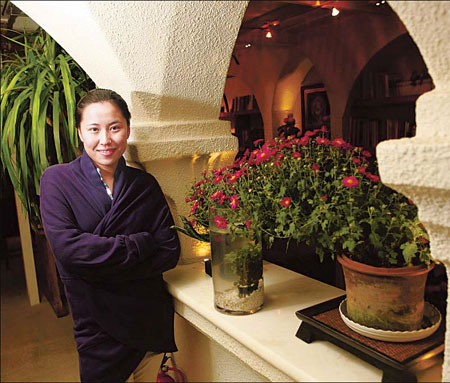
Sichuan chef and owner of Yi restaurant Zhou Yuanyi says her cuisine is the real deal. Photos by Zou Hong / China Daily
With soft rock drifting across a Western-styled restaurant, "genuine?southwestern Chinese cuisine is certainly not what it used to be, Eileen Wen Mooney discovers
Food lovers in the capital can certainly take their pick from the masses of Sichuan restaurants on offer, a figure that seems to expand daily, but getting hold of authentic cuisine is not so easy.
That's why the opening of Yi restaurant, by Sichuan native Zhou Yuanyi, is helping to warm the hearts of many spice-lovers on these chilly autumn days.
"They don't make any authentic Sichuan dishes," said 22-year-old Zhou, referring to chefs at other Sichuan restaurants. She added that her chefs also sometimes don't listen to her because of her age.
Zhou said her family has owned a restaurant in Lhasa, capital of the Tibet autonomous region, for decades. Growing up between Sichuan and Tibet explains the influences in some of her dishes.
Her eyes sparkle when she discusses old recipes from her grandmother or the various spices she incorporates into her cooking. Several times she stopped in the middle of describing a dish to run to her kitchen and grab a sample of something that words alone couldn't justly explain.
First on the list to try was Mizhi Xiao Niurou (32 yuan), a tender braised beef, thinly sliced and arranged between slivers of cucumber, then served with a Tibetan sauce.
This unique sauce is a blend of fennel seeds grown in the highlands of Tibet - which has a minty flavor and a powerful aroma akin to cumin - as well as ground Sichuan chilies and some of her grandmother's homemade broadbean chili paste.
Next up was Yuxiang Roumo Qiezi (28 yuan). This eggplant dish, dotted with minced pork, wasn't swimming in oil.
I followed this with Suanla Machixian (18 yuan), a wild vegetable bathed in a vinegary dressing, which was light and refreshing.
The twice-cooked pork (38 yuan) is another dish to rave about. Again it wasn't greasy at all, but does have an unusual taste because of the addition of a Tibetan spice.
Laoganma Tudouding (22 yuan) is an earthy dish smothered in diced scallion, black beans and a handful of fresh chilies, resulting in a union of scallions, salty black beans and the kick of something hot.
Huoxiang Jiyu (48 yuan) is a braised fish with broad bean chili paste served with diced sour radish pickles and garnished with hyssop, a liquorice herb. The pairing of sour pickles and hyssop was a little disappointing though because two powerful aromas seemed a bit antagonistic and worked against each other.
However, the Dandan Mian (12 yuan) are a must try and definitely some of the best noodles in town. They were prepared with just the right amount of condiments, reflecting the true flavors of Sichuan cooking: sweet, salty, hot and sour. Lastly, the addition of preserved mustard greens really highlighted the flavor of this popular dish.
The pan-fried scallion buns (12 yuan for six) are equally impressive as the meat filling tastes like real meat and is not diluted with water or cornstarch. The sticky rice cakes (12 yuan for six) with brown sugar are a nice treat to wrap a meal up with.
The decoration at Yi is somewhat more Western than old Sichuan, except for some of the antique rustic furnishings from Dayi county, Yuanyi's hometown. Carved wooden antiques are implanted in the walls, contrasting with modern sofas and glass walls, and the comfortable loft-like second floor is decked out with 1920s Western knick knacks, framed photographs and potted plants.
On the two nights I dined at Yi, the mellow voice of Jack Johnson could be heard softly in the background, reminding me that while the food lays claim to be authentic, the location itself is nothing short of unique.
